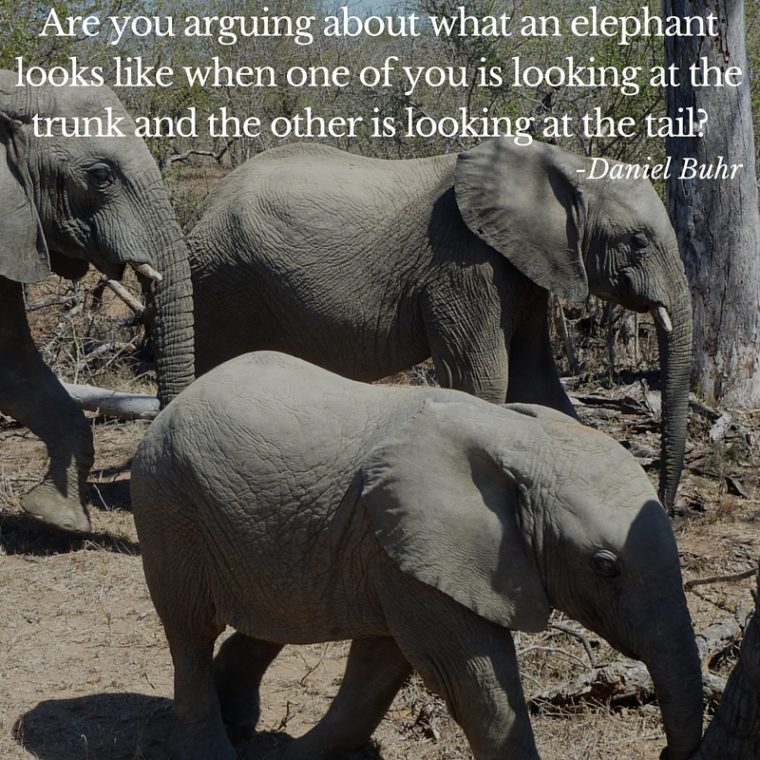
 I’m delighted to share a guest post from Daniel Buhr in the series on Disagreement. Daniel was one of the co-authors of the book Energize Your
I’m delighted to share a guest post from Daniel Buhr in the series on Disagreement. Daniel was one of the co-authors of the book Energize Your  Leadership. He works in health and safety at a Fortune 500 Company and shares his passion for leadership at cybuhr.com and @Cybuhr on Twitter.
Leadership. He works in health and safety at a Fortune 500 Company and shares his passion for leadership at cybuhr.com and @Cybuhr on Twitter.
Heels dug in? Check.
Ears closed? Check.
Mind made up? Check.
Bring on the discussion, I’m ready. There’s no way I’m going to lose this one!
Have you ever approached a disagreement this way? I sure have. While I may not have expertise in resolving disagreements I certainly have plenty of experience in being a part of them. One thing I have learned from this experience is that as soon as you create a Me vs. Them situation you’ve already lost.
If someone has to be the winner then everyone is a loser. No one becomes more from someone else becoming less.
First determine if it is even a disagreement at all. You may in fact simply have different perspectives on the same viewpoint.
- Are you arguing about what an elephant looks like when one of you is looking at the trunk and the other is looking at the tail?
- Merge your thoughts, enrich your perspective, and move on to a more interesting discussion, like which end of an elephant is more dangerous.
Another possibility is that the other person isn’t disagreeing with you, they just hate you. If you took their viewpoint they would take yours. They’re coming from a place of pain and fear. Recognize this situation for what it is and deal with it accordingly. One option is simply to walk away. Even then, do so with respect.
If you do indeed have a disagreement remember that having a disagreement doesn’t mean you have a problem, it means you have an opportunity. Every single person is unique with their own story, their own perspective on the world, their own vision for life.
- Disagreement is inevitable.
- Arguments are unnecessary.
Take a positive view of disagreements as a natural part of life and learn from them.
Start with listening, as hard as that may be. The notion that listening implies consent just isn’t true. Listening implies respect. Listen to understand and you will learn so much more than you would in a verbal tennis match.
Don’t make the disagreement personal. Focus on the issue and don’t allow personal attacks to become part of the dialogue. However, keep the interaction personal. Recognize and respect each person for who they are.
Disagreement with someone can actually be a form of respect. It says I trust you enough to open up to you. It says I believe in you enough to challenge you. It says, “Let’s work together on this and we’ll find a solution that’s better than either of us could find on our own.”
Realize that you can’t change someone’s mind. You can only influence them to make a different choice. By trying to gain what you can never have, control, you will lose what you most need, influence.
Resolving disagreement is by its nature a matter of leadership. Leadership gathers people together on higher ground. That is where the best solutions will be found. Bring people to a place of sufficient agreement that allows everyone to move forward.
The ultimate test of whether a disagreement has been handled successfully is to apply Robert Greenleaf’s test of servant leadership. “Do those served grow as persons? Do they, while being served, become healthier, wiser, freer, more autonomous, more likely themselves to become servants?” To determine how well you have led the handling of a disagreement ask yourself how well you have served those involved. Ironically it can be difficult for us as leaders to resolve disagreement since we are passionate about our beliefs and values. That’s why we lead.
Just remember – respect and curiosity. And always, always put people first.
Give ear to the dissenting voice.
Give voice to the silent.
Give respect to all.




THANK YOU for commenting and sharing!
YOU ARE INVITED: To add your comments and to share your professional, personal and faith-based stories. Diverse opinions, compassion, and inspiration are welcome! (I reserve the right to delete comments that are offensive or off-topic.)